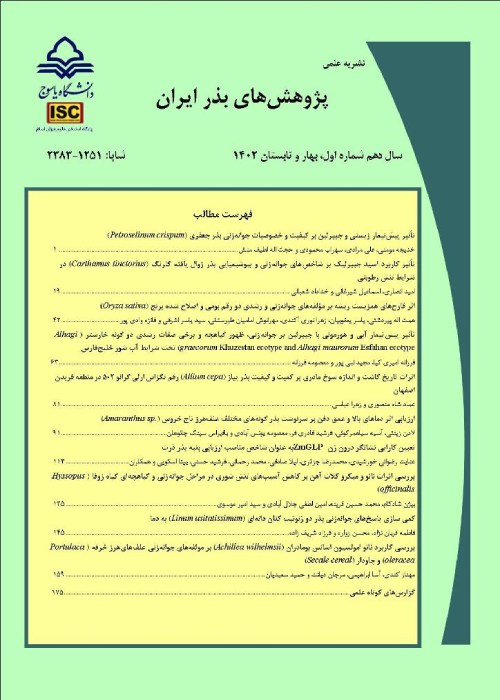Effect of Zinc and Boron Application on Wheat Mother Plant under Heat Stress on Cell Membrane Integrity of the Produced Seed and Physiological Quality of Seedling
Providing important and effective elements such as zinc and boron- especially in areas where the soil for some reason cannot meet the needs of the plant- will be a good solution to improve seed and seedling quality and nutrition, and community health status. A considerable part of the wheat producing regions in the country are faced with late season haet during seed development stages. Thus, the present study will investigate the effect of heat stress and mother plant nutrition with zinc and boron micronutrients on seed deterioration and physiological quality of wheat seedlings.
In a field experiment, wheat seeds were planted on two suitable planting dates (November 20) and late (January 5) to apply late-season heat stress during the seed development stage with three replications in Ramhormoz, Iran. The nutrition of mother plants with zinc and boron elements was done at three levels (nutrient-free and application of zinc and boron) as a foliar application. After harvest, the seeds were transferred to the laboratory and membrane integrity of seed cells was investigated using an electrical conductivity test as an indicator of deterioration. Another part of the seeds was planted in a factorial pot experiment based on RCBD with three replications to evaluate the quality of seeds and seedlings in the greenhouse.
The results showed that exposure of seeds to heat stress during development reduced seed quality as well as seedlings so that the cell membrane in the seeds produced under heat stress conditions was damaged and their electrical conductivity increased by 19%. Also, these seeds showed more sensitivity to deterioration. The percentage of seedling emergence in the stressed seeds decreased by 21.66%. Heat stress also reduced seedling quality indices such as chlorophyll content, shoot dry weight, and root dry weight. Application of zinc and boron on the mother plant not only led to improved quality of seeds and seedlings under normal conditions but also the negative effects of heat stress on seed and seedling quality were reduced. There was a significant negative correlation between the seed electrical conductivity test and qualitative parameters. Therefore, the use of this test is recommended to determine the quality of seeds, especially seeds produced under late-season heat stress conditions.
Noting the negative effect of heat during seed development on seed quality, planting dates should be adjusted as much as possible so that the seed development stage does not coincide with the late-season heat stress. Due to the beneficial effects of using zinc and boron in the mother plant on many traits related to the quality of seeds and seedlings, their application- especially zinc- in soils with deficiency or the possibility of heat stress at the end of the season is recommended.
- حق عضویت دریافتی صرف حمایت از نشریات عضو و نگهداری، تکمیل و توسعه مگیران میشود.
- پرداخت حق اشتراک و دانلود مقالات اجازه بازنشر آن در سایر رسانههای چاپی و دیجیتال را به کاربر نمیدهد.



